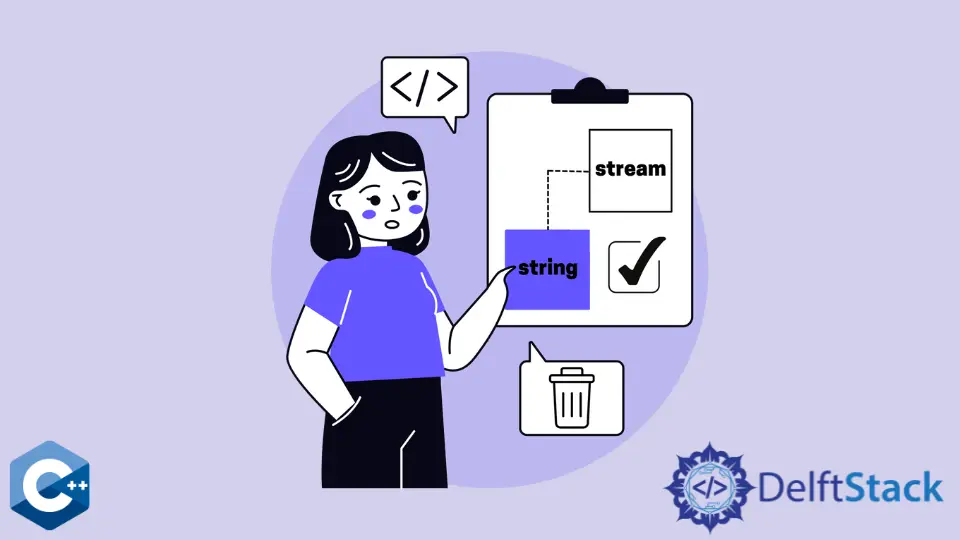How to Clear Stringstream in C++
- Understanding Stringstream
- Method 1: Using str() with an Empty String
- Method 2: Using clear() Method
- Method 3: Using swap() with an Empty Stringstream
- Conclusion
- FAQ

When working with C++, the stringstream class is a powerful tool for handling string manipulation and data formatting. However, there may come a time when you need to clear the contents of a stringstream for various reasons, such as reusing the stream or resetting its state.
In this article, we will explore various methods to clear a stringstream effectively. Whether you’re a beginner or an experienced developer, understanding how to manage your string streams will enhance your programming skills and improve the efficiency of your code. Let’s dive into the methods you can use to clear a stringstream in C++.
Understanding Stringstream
Before we get into the clearing methods, it’s essential to understand what a stringstream is. A stringstream is part of the C++ Standard Library and allows you to read from and write to strings in a manner similar to file I/O. It provides a convenient way to format data and convert between types. However, as you work with it, you might need to clear its contents to avoid unexpected behavior in your program.
Method 1: Using str() with an Empty String
One of the most straightforward methods to clear a stringstream is to use the str() function, passing an empty string as an argument. This effectively resets the contents of the stream.
#include <iostream>
#include <sstream>
int main() {
std::stringstream ss;
ss << "Hello, World!";
std::cout << "Before clearing: " << ss.str() << std::endl;
ss.str(""); // Clear the stringstream
std::cout << "After clearing: " << ss.str() << std::endl;
return 0;
}
Output:
Before clearing: Hello, World!
After clearing:
In this example, we first create a stringstream and populate it with a string. By calling ss.str(""), we clear the contents of the stringstream. The str() method allows you to set a new string, and by passing an empty string, we effectively reset the stream. This method is quick and efficient, making it a popular choice for developers.
Method 2: Using clear() Method
Another method to clear a stringstream is by using the clear() method. This method is primarily used to reset the error state flags of the stream, but it does not clear the contents. However, it can be combined with the str() method to achieve the desired outcome.
#include <iostream>
#include <sstream>
int main() {
std::stringstream ss;
ss << "Hello, World!";
std::cout << "Before clearing: " << ss.str() << std::endl;
ss.clear(); // Clear the error flags
ss.str(""); // Clear the stringstream contents
std::cout << "After clearing: " << ss.str() << std::endl;
return 0;
}
Output:
Before clearing: Hello, World!
After clearing:
In this code snippet, we first populate the stringstream and display its contents. By calling ss.clear(), we reset any error flags that may have been set during previous operations. Following that, we use ss.str("") to clear the contents of the stream. This two-step process ensures that the stream is in a clean state, making it ready for new data.
Method 3: Using swap() with an Empty Stringstream
A less common but effective method to clear a stringstream is to use the swap() method. This technique involves swapping the contents of the current stringstream with an empty stringstream.
#include <iostream>
#include <sstream>
int main() {
std::stringstream ss;
ss << "Hello, World!";
std::cout << "Before clearing: " << ss.str() << std::endl;
std::stringstream emptyStream;
ss.swap(emptyStream); // Swap with an empty stringstream
std::cout << "After clearing: " << ss.str() << std::endl;
return 0;
}
Output:
Before clearing: Hello, World!
After clearing:
In this example, we create an empty stringstream and swap it with our original stringstream using ss.swap(emptyStream). This effectively clears the contents of the original stream. The advantage of this method is that it can be particularly useful in scenarios where you want to ensure that the original stream is completely reset, including its internal state.
Conclusion
Clearing a stringstream in C++ is a fundamental skill that can enhance your programming efficiency. Whether you choose to use the str() method, the clear() method combined with str(), or the swap() method, each approach has its benefits. Understanding these techniques allows you to manage your string streams effectively, ensuring your code runs smoothly without unexpected behaviors. By mastering these methods, you’ll be better equipped to handle string manipulations in your C++ projects.
FAQ
-
What is a stringstream in C++?
A stringstream is a part of the C++ Standard Library that allows you to read from and write to strings using stream operations. -
How do I clear the contents of a stringstream?
You can clear the contents of a stringstream using thestr()method with an empty string, theclear()method, or theswap()method with an empty stringstream. -
Can I reuse a stringstream after clearing it?
Yes, after clearing a stringstream, you can reuse it to store new data without any issues. -
What happens if I don’t clear a stringstream before using it again?
If you don’t clear a stringstream, it may still contain previous data, leading to unexpected results when you try to read from or write to it. -
Is there a performance difference between these methods?
Generally, all methods are efficient, but the choice of method may vary based on the specific use case and personal preference.
